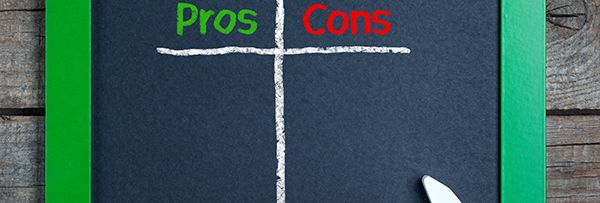As a homebuyer, choosing the right mortgage loan can be a daunting process. Though it may appear from the chart below that there are only the 4 options of FHA loans, Conventional loans, VA loans, and USDA loans, each type has variable programs and each of those programs have various requirements. The below comparison charts will give you a brief synopsis of the pros and cons of each mortgage type, but it is imperative you talk to a true mortgage expert. They can help guide you toward not only the best mortgage type, but the best program variation to help you and your family reach your short term AND long term homeownership goals.
|
|
| |
Pros of FHA
|
|
Cons of FHA
|
- 3.5% down payment minumum.
- Seller is allowed to pay all of the closing cost and prepaids (but not the down payment) up to 6% of the sales price as part of the negotiations of the contract.
- Assumable loan (which could be valuable if you sell your home when interest rates are much higher than current market).
- Interest rates will typically be less than a Conventional.
- More flexible in credit and past derogatory (i.e., foreclosure, tax liens, collections, etc.).
- Only loan that typically allows a non-occupying co-signer.
|
- Lifetime monthly MIP (unless putting down 10% or more)
- Also has an upfront MIP fee that is rolled into the note.
- Monthly MIP is typically higher than a Conventional.
|
|
|
| |
Pros of Conventional
|
|
Cons of Conventional
|
- PMI will automatically drop off at 22% equity. This will typically take around 9.25 years unless more principal is paid than required.
- Minimum 3%-5% down payment.
- Typically lower monthly PMI than FHA.
- Only loan that allows financing of an investment property (minimum 15% down).
|
- Rates are typically around .25-.75 higher than FHA, VA or USDA depending on the credit score (There are Conventional adjustments to the rate based off the credit score. These are not lender adjustments but rather Fannie or Freddie adjustments. Fannie and Freddie insures Conventional loans).
- Seller can only pay up to 3% of the sales price toward closing costs and prepaids unless the borrower is putting 10% or more down (then 6% seller contribution is allowed).
- Stricter guidelines on ratios and credit.
|
|
|
| |
Pros of USDA
|
|
Cons of USDA
|
- Zero (0) down payment.
- Seller is allowed to pay all of the closing cost and prepaids up to 6% of the sales price as part of the negotiations of the contract.
- Interest rates will typically be lower than a Conventional loan.
- Only loan that allows the rolling in of closing costs into the loan amount as long as the houses appraises for more than the loan amount.
|
- Lifetime monthly form of MIP (an annual fee percentage tied to the loan amount, and paid monthly) called a guarantee fee.
- Also has an upfront guarantee fee of 2.75% that is rolled into the note. (As of October 1st, 2016 this fee will be reduce to 1%!)
- Financing/program available only for specific rural areas. You can check eligibility on the USDA website.
- Strict income limitation guidelines.
- Takes typically 1-3 week(s) longer to close than a standard loan as it is underwritten twice - once by the lender and once directly at USDA.
- Stricter guidelines on ratios and credit.
|
|
|
| |
Pros of VA
|
|
Cons of VA
|
- Zero (0) down payment.
- Seller is allowed to pay all of the closing cost and prepaids up to 4% of the sales price + Title Policy + Survey + around $1,915 in VA non-allowables as part of the negotiations of the contract.
- Interest rates will typically be lower than a Conventional loan.
|
- Upfront Funding Fee of 2.15 if never used your VA eligibility to purchase your home, or 3.3 if have used it before. (If borrower has a Service Connected Disability no Upfront Funding Fee is required.)
- The Funding Fee is rolled into the note.
- VA chooses the appraiser.
- Seller needs to agree to pay the VA non-allowables or the lender can pay with rebate pricing from a higher interest rate.
- Only loan type that requires a clear WDI (Termite) report.
|

